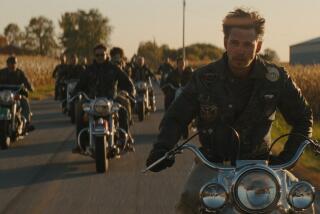OUTRIDERS OFFER S.D. NEW SOUND
- Share via
SAN DIEGO — Ken Layne is a cowboy. His voice still carries traces of a New Orleans drawl, he listens to old country-Western records, and he likes to write songs that tell stories.
Rick Wilkins’ heroes are Jimi Hendrix and Eddie Van Halen. He doesn’t play his guitar, he attacks it--and the sounds he gets, fuzzy and distorted, are the stuff of which heavy metal dreams are made.
Paul Denton plays his bass with the forceful determination of a be-bop jazz musician. He also has a penchant for improvisation.
Sam Chammas, well, he pounds his drums with the same steady rock ‘n’ roll beat that Charlie Watts used more than two decades ago on his first recordings with the Rolling Stones.
What do these four musicians have in common? Not much, aside from the fact that they all play together as the Outriders, one of the more promising--and unusual--rock ‘n’ roll groups to hit the San Diego music scene in quite some time.
“Our individuality is what makes us unique,” said guitarist Wilkins, downing the last of his beer with a hearty swallow. “It’s like sticking four different types of music into a blender and seeing what comes out.
“Nobody’s told us what we can’t do yet, so we do whatever we can get away with. And by not trying to limit what we do, we’ve developed our own sound.”
The Outriders’ sound suggests a lot more cohesion than Wilkins’ comments imply. Despite their diverse backgrounds and musical tastes, the four share a strong dislike for the high-tech direction rock music started taking in the 1970s.
So, once their lineup stabilized in the spring of 1985, they decided to go back to the basics: No synthesizers or other electronic gimmickry; just guitar, bass and drums. Sparse arrangements. And simple, honest melodies, rhythms and lyrics incorporating elements of the blues, country and rockabilly.
Wait a minute. All this sounds a lot like the “American roots” sound that the rock press is ballyhooing all over the country and that bands like the Beat Farmers and Lone Justice have taken to new heights of popularity.
Wrestler Records, headquartered in Austin, Tex., must think so, too. Several weeks ago, the tiny independent record company, which is credited with helping launch the “American roots” movement, signed the Outriders and another San Diego band--the Paladins, who play a mix of rockabilly and blues--to national recording contracts.
But attaching the “American roots” label to the Outriders doesn’t rest well with the band members.
“We don’t want to be a clone,” Wilkins said. “We don’t want to be stuck into some little box just because it happens to be trendy right now.
“We can’t get a gig at a popular nightclub like Lehr’s Greenhouse because we don’t play the music you hear on the radio, yet at the same time, we’re not weird enough to play new wave clubs like the Spirit.
“All we’re doing is playing basic rock ‘n’ roll the best way we know how, and apparently that makes us different enough so that someone wants to record us and release our records.”
Still, the public’s fascination with back-to-basics rock ‘n’ roll is likely to help the Outriders. Already, the fact that they have been signed by a record company that’s getting so much national notice has gotten them more local attention.
They have graduated from Kelly’s, a tiny pub in the College Area where they had played most of this year, to the much larger Old Pacific Beach Cafe, where they’re appearing every Wednesday night through the end of November.
After that, they have bookings at other rock nightclubs like the Halcyon in Point Loma and the Old Del Mar Cafe--as well as the promise of a Los Angeles gig sometime in December.
Once their album, recorded during the summer at Western Audio recording studio in Santee, is released by Wrestler in January, they plan to hit the road on their first-ever national tour.
Vocalist Ken Layne said: “I like to think of the Outriders as a rock band like there used to be, sort of like the early Rolling Stones.
“We’re definitely not living in the 1950s or ‘60s; all we’re trying to do is show that the youthful energy of the early rock ‘n’ roll bands is just as viable in the ‘80s.”
More to Read
The biggest entertainment stories
Get our big stories about Hollywood, film, television, music, arts, culture and more right in your inbox as soon as they publish.
You may occasionally receive promotional content from the Los Angeles Times.










